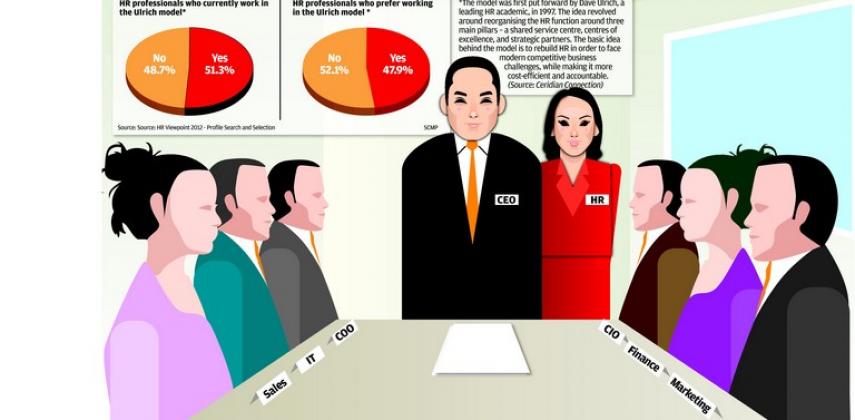John Cremer asks why HR people are slow to transcend their typical roles
Human resources (HR) management in Asia has undoubtedly come a long way over the last 20 years, with employers recognising that "putting people first" really does pay off in the long run. As a result, the discipline is now seen in a changing light. Instead of still being considered largely an administrative function, it is instead seen as being able to shape a winning culture and contribute strategic insights which, in turn, can significantly enhance a company's staff competencies, operational efficiency, forward planning and overall reputation.
Along with the positives, though, other developments affecting the profession are giving some cause for concern. A number of these concerns were identified in the recent "HR Viewpoint" survey carried out by Profile Search and Selection together with affiliate companies in other regions. The survey analysed feedback received last year from close to 3,000 respondents in Asia, Europe, Australia and New Zealand, with the results revealing what HR professionals are doing, what they want to do and, importantly, what the sector is not doing, but should be.
Addressing the latter issues, in particular, takes on new urgency at a time when many employers in Hong Kong and China are increasingly relying on HR to improve retention rates, anticipate training needs and implement organisational change.
"Among the treasure trove of data, there were some obvious takeaway points and a few areas of alarm," says Richard Letcher, founder and managing director of Profile Search and Selection. "One of the biggest things for me was the lack of opportunities for young HR talent trying to enter the profession."
In the past, he says, junior recruits would typically learn the ropes by taking on various administrative tasks. Now, with the move towards both automation and the outsourcing of more routine processes - such as leave records and payroll - a whole band of entry-level HR jobs is disappearing.
"The majority of respondents believe there is now too little room for learners," Letcher says. "The economic downturn over the last four years has obviously contributed to the lack of opportunities, but in Asia specifically, 42 per cent of the replies also said there was no formal career-development path for HR people in their company."
The implications are easy to see. There is a finite pool of HR executives with more than five years of experience who have the accompanying general know-how and foresight. Companies can't expect to meet future needs by simply poaching locally or hiring from overseas. They also can't assume that recent graduates - even those whose subject was HR-related - will necessarily want to sign up for a role which, at first glance, doesn't offer the prospect of broad-based structured training, progressive challenges, and a clear route to wider management responsibilities.
The survey results also seem to show a lack of ambition among HR staff - or perhaps it could just be realism. For instance, when asked what they considered the most important skill on which they should focus, 35 per cent said organisational development and 19 per cent opted for change management. In view of the recent rhetoric about HR executives deserving a seat at the top table, the results are concerning.
"A very surprising number of HR professionals don't cite commercial and financial skills as being important," Letcher says. "Only 7 per cent mentioned this, and the finding is backed up by the fact that only 5 per cent actually say they would like to do a line-management role."
To meet new demand and create better alignment as the business world evolves, Letcher recommends the introduction or extension of several initiatives. Firstly, companies should make a greater commitment to training their own HR specialists from the ground up, rather than hoping to recruit expertise or plug gaps on an ad hoc basis. Secondly, whatever the size of the company, it should be a rule to give newer staff exposure to every other department, so that they understand work procedures and priorities, as well as what is needed from HR and why.
Thirdly, it should be made clear, especially to graduates, that HR is not a silo. Some individuals may be more than happy to spend their whole career within the one discipline, but employers should also offer routes and opportunities to move in or out.
"I haven't come across many companies with programmes for good HR people to do in-house rotations," Letcher says. "And if graduates are more interested in working in other sectors because there are not enough jobs for entry-level learners, you have to ask what will happen down the road if there is a shortage of talent."
When thoughts turn to expansion, one option for employers is to "parachute in" overseas-based executives who are well up on industry best practice - though they will probably lack local knowledge and have no Cantonese or Putonghua skills. Another is to ask the existing team to take on more work, which will only get you so far.
As the survey results found, Asia-based HR professionals are already working substantially longer hours that their counterparts elsewhere. A total of 87 per cent of respondents claimed to be working more than 40 hours a week, compared with 74 per cent in Australia and New Zealand, and 61 per cent in Europe.
"I think that HR is an incredibly important function, and the organisations which get it right do consistently better in terms of their bottom line," Letcher says. "HR sometimes has a bad rap, but hiring, engaging and training the right people is so important that it should have a bigger seat at the table. The executives, though, still need to get closer to the rest of the business."


